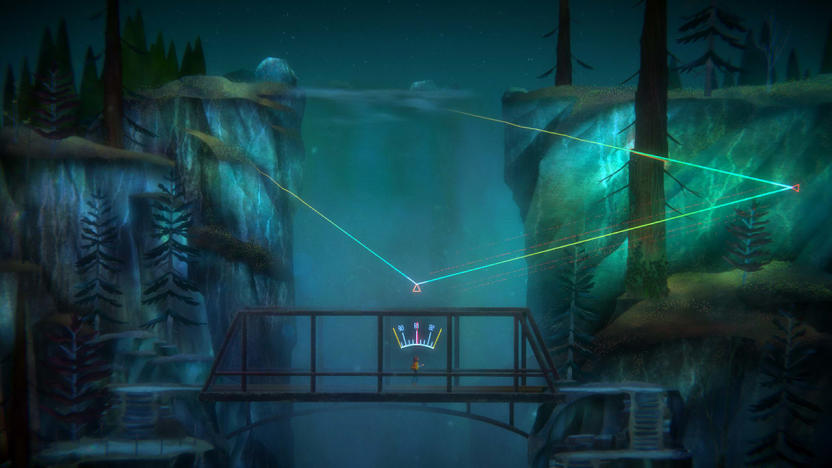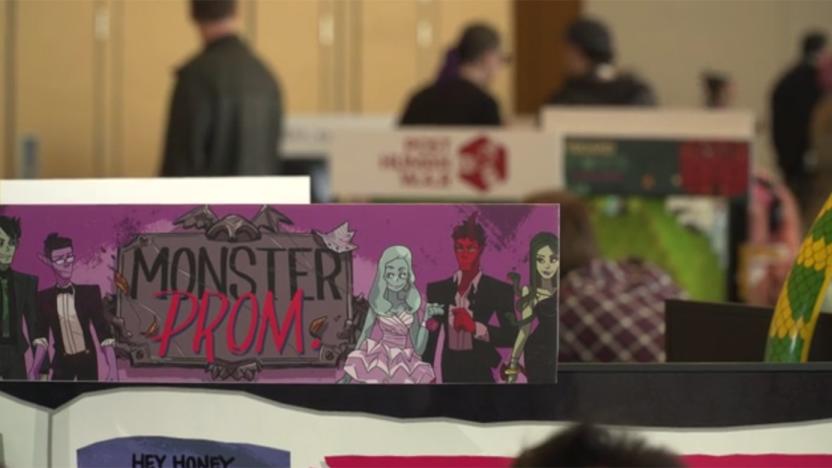indies
Latest

Indie gems ‘Rogue Legacy 2’ and ‘A Little to the Left’ hit Nintendo Switch today
It’s a great day to be a Switch fan.

'Oxenfree II: Lost Signals' headlines a new crop of Switch indie games
A new OlliOlli game is on the way, while classic puzzle-platformer 'Fez' hits Switch today.

Watch Nintendo's latest Indie World Showcase here at noon ET
Expect around 20 minutes of indie games that are coming to Switch.

You get to pick the next free games on Twitch Prime
Twitch has been giving away free games with a Prime membership for awhile now, but now you'll have a say in what's handed out each month. With the Indie Amplifier program, users can pick from eight indie games and the one with the most votes will be given away March 15th. Here's what's in the running:

There are a dozen new ideas at GDC 2017's Indie Megabooth
Indie Megabooth has become something of a haven for gamers looking for fresh experiences and new ideas. It's become a staple event for indie games at shows like PAX, Gamescom and, of course GDC. This year's developer conference is no exception, featuring a dozen games that defy control conventions, make players question their identities and explore possible futures with fun sci-fi settings.

Realm Zero enters alpha testing
Looking for another indie sandbox title to follow along? Realm Zero has your number, and not coincidentally, it just entered its second phase of alpha testing. No, really, it's not just a collection of concept art! There's a video past the break and everything. So if you're leery of giving your heart to a game that's a bunch of lovely ideas with no actual game, well, at least that's not quite what's happening here. The game promises to have an evolving world based on player action, with combat based upon FPS models rather than on the traditional level-based grind of most MMOs. It also boasts a skill system that allows you to build a character without having to make permanent choices, so you can mix and match over time to build your preferred character. Read more on the official site. [Thanks to Sandboxer for the tip!]

'Awful,' 'intimidating,' 'complicated': Indie devs on the guilt of success
It's said that money can't buy happiness. In fact, for some indie game developers, an influx of money can mean just the opposite. In a New Yorker feature, developers like Rami Ismail of Vlambeer (Ridiculous Fishing, Luftrausers), Edmund McMillen of Team Meat (Super Meat Boy) and Davey Wreden of Galactic Cafe (The Stanley Parable) explain how the success of their games have, in some ways, made their lives harder, not easier. Ismail, for example, cited his feelings of guilt over making more money in a single night than his mother makes all year. "Ever since I was a kid I've watched my mom wake up at six in the morning, work all day, come home, make my brother and me dinner," Ismail said. Regarding his overnight success, he told the New Yorker, "It feels awful. I couldn't get rid of the image of my mother in her car, driving to work." McMillen likewise experienced an impact on his familial relationships. He said that after the release of Super Meat Boy and Indie Game: The Movie - a documentary in which he is prominently featured - he had experienced distant relatives and old acquaintances asking him for money. "This success has artificially elevated me; it's caused jealousy, even hatred," McMillen said. "The money has made relationships complicated." Wreden wrote on his studio's site in February that he was experiencing depression, and told the New Yorker that, with the success of The Stanley Parable behind him, he must now look ahead to creating its successor. "It's intimidating to think that we have enough time and resources to do whatever we want," Wreden said. For more on the developing, expanding indie scene, be sure to check out our in-depth feature report. [Image: Vlambeer]

Joystiq Weekly: Titanfall, The Last of Us DLC and Mario Kart 8 rivals
Welcome to Joystiq Weekly, a "too long; didn't read" of each week's biggest stories, reviews and original content. Each category's top story is introduced with a reactionary gif, because moving pictures aren't just for The Daily Prophet. Did you see that the Koopalings are going to be new characters targets in Mario Kart 8? The Koopalings, the brats responsible for loads of deaths dealt to Mario and Luigi with lava, twirling hoops and rings of death from magic wands? Yup, we've got new rivals. You're annoying, Baby Mario, but you haven't stopped us from moving on to the next world of a Mario game before. Watch your back, Koopalings. There's something about family-friendly, inclusive Nintendo games that bring our most competitive spirit. Have you ever calmly congratulated a friend after their star thievery earned them the title of Party Champion in Mario Party 2? Have you nodded in admiration of your opponent's strategy in Mario Kart Wii, right after they steal your victory with a red shell a few feet away from the finish line? We have a feeling your dialogue might have been more ... "spirited" than civil. We're not judging though - heck, we just threatened a bunch of baby turtles one graf above this! Of course, a lot more happened this week beyond the Koopalings opening themselves up for a world of hurt. This week brought NPD data for January, a review of The Last of Us' "Left Behind" DLC and video previews for Titanfall and Evolve! There's lots more beyond that after the break though, so jump the break and dive into the biggest stories of the week!

PBS Game/Show asks 'Are Angry Fanboys Bad for Games?'
PBS' Game/Show is back again, and this time we're going to sit and talk about our feelings, m'kay? Specifically, host Jamin Warren wonders if our feelings of anger and disapproval toward games we don't like are harming the industry. Warren points out how negative attitudes toward creators have propagated thanks to the internet, and cites the departure of several high-level industry personnel as evidence that something in our lines of communication is broken. We all get angry, frustrated or disappointed with our games every now and again, but are we expressing that properly? "We should support our favorite creators for how they create, not always for what they create," Warren argues in the video. "In film, you might be a fan of Kathryn Bigelow or Quentin Tarantino, but that doesn't mean that you expect them to make 10 sequels to Point Break or Pulp Fiction. ... It's important that we give game designers the exact same latitude." Check out the episode, consider the behavior being talked about, and tell us what you think in the comments. [Image: PBS]

The Daily Grind: Should government regulate crowdfunding?
Earlier this week, the US Securities and Exchange Commission proposed rules for regulating public equity crowdfunding that could hit as early as February of next year. If adopted, these rules could affect kickstarters and similar ventures dramatically, according to Forbes. Notably, the regulations would cap crowdfunding investment revenue at $1 million dollars per year, limit individual contributions according to income, eliminate most advertising, and require management through a registered brokerage. The rules are intended to allow crowdfunding ventures to legally sell shares and accept investors, not just rely on donations as we see in the typical MMO kickstarter. But as Forbes argues, the rules won't necessarily have the intended effect as typical project creators can't actually afford to meet the regulations since that's why they were using crowdfunding in the first place. We wonder whether Congress and the SEC will target donation-driven crowdfunding next. It seems to me that at least in MMOland, a lot of studios would struggle, whether they're Star Citizen with 24 million bucks raised to date or Baby's First MMO Startup with two part-time employees and a cat running PR. Then again, kickstarter frauds aren't unheard of, and a lot of people have seen their donations-that-sure-sound-like-investments go down the toilet. What's your take? Should the SEC be regulating crowdfunding ventures the way it would any other investment or fundraising method? [Our original question assumed that Kickstarter donations would be affected. Updates to the SEC proposal have made it clear this is not the case, so we have updated the premise here accordingly, though the question still stands.] Every morning, the Massively bloggers probe the minds of their readers with deep, thought-provoking questions about that most serious of topics: massively online gaming. We crave your opinions, so grab your caffeinated beverage of choice and chime in on today's Daily Grind!

3000AD partners with DC for Line of Defense comic
Derek Smart-led Line of Defense developer 3000AD announced this week that it has partnered with DC Comics to create a digital comic book set in the Line of Defense universe. The comic, built as a 12-part miniseries, will cover four separate stories from both factions of the game's core conflict. One story will launch each quarter, with the first hitting shelves this month and the final set due in July of 2014. While the Line of Defense comic is mostly stuck in the digital world, a limited edition printing of the first story, Payback, will be available as a free giveaway at DC Comics' booth during New York Comic-Con. Ten thousand copies will also be distributed to comic book stores; Line of Defense fans who can't make the con can pick up a free copy October 16th at their local nostalgia dungeon. The Line of Defense game, meanwhile, continues its cruise through a very extended beta. [Thanks to Saucelah for the tip!]

Self-publishing rumored for Xbox 360, Microsoft has nothing to announce
Xbox 360 developers may be able to self-publish their games on Xbox Live Arcade starting this August, according to a recent update from The Pinball Arcade developer FarSight Studios. Microsoft, however, maintains that there have been no official changes to the Xbox 360's publishing situation: "We have not announced any changes to our publishing policy for Xbox 360," a representative told Joystiq. Meanwhile: "Microsoft has just announced that indie developers (like FarSight) can now self-publish on Xbox Live Arcade instead of being required to find publishers for their games," FarSight's announcement reads. "Microsoft has stated that the new program will open in August- we will do everything we can to get The Pinball Arcade (and all of the new Table Packs) back on the Xbox 360 as quickly as possible." Microsoft announced earlier this week that indie developers will be able to self-publish on the Xbox One, but no mention was made of the Xbox 360 or the existing Xbox Live Arcade. The Microsoft representative we spoke to said that the company will be "sharing more about self-publishing on Xbox One at Gamescom."

Indie developers cautiously optimistic about self-publishing on Xbox One
Microsoft's reversal of its publishing philosophy for the Xbox One has obvious and wide-reaching implications for the indie development community. While the original plan mandated that developers release games through a third-party publisher or broker a deal with Microsoft itself, indies will now be able to self-publish. Furthermore, retail Xbox One SKUs will function as development units, which historically are more expensive and more difficult to acquire than off-the-shelf models. "Ideally, this news could have been broadcast more proudly and loudly months ago, giving indies more time to prepare strategies for upcoming games," Minicore Studios founder and CEO John Warren told us, "but I suppose they don't owe anyone that courtesy. We know now, so now we can prepare for life with a Microsoft console, which is something I wouldn't have said yesterday." Warren and his team at Minicore are in the process of Kickstarting PC, Mac and Xbox 360 versions of their latest project, Laika Believes: The Sun at Night. "I think releasing on Xbox One without a publisher is a big step forward, of course, but the fact that (eventually) I'll be able to use my retail console as our dev kit is huge," he added. "My secondary (maybe flailing and futile) hope is that the fees for publishing won't be insane. It's one thing to only have to shell out $600 for a dev kit, but quite another if we have to spend another $10k on publishing fees. My hope is they'll be content with 30 percent of revenue and be done with it." Cautious optimism was a consistent theme among most of the indie developers we reached out to, though some had greater reservations over Microsoft's inner machinations than others.

Microsoft to allow indie self-publishing on Xbox One, retail consoles will double as debug units (updated)
Microsoft's Xbox One is getting decidedly more indie-friendly with today's confirmation from Microsoft that its forthcoming game console will double as a developer debug unit. In so many words, each $500 unit purchased at retail this holiday will also run in-progress game code, enabling developers to get in on the action all the more affordably (debug versions of game consoles cost far more than retail game consoles, and tend to look slightly different from their retail counterparts). "Our vision is that every person can be a creator. That every Xbox One can be used for development," Xbox corporate VP Marc Whitten said in a statement. Of course, such a move wouldn't make much sense without eased publishing regulations -- the Xbox 360 allows for self-publishing only in its ghettoized "indies" section, and all other games require a Microsoft-certified publisher to distribute physically or digitally. Going forward with the Xbox One, developers can publish their own games; Microsoft's looking at a quick turnaround on that code certification as well, according to reports, though we're told there'll be more info at Gamescom come late August. The full statement from Whitten can be found just below the break. Update: We've also added responses from indies to today's news below.

Star Citizen's Roberts: 'Every day I'm just thinking about how to make this game awesome'
Can't get enough Star Citizen news? We can't either, so we're passing along this nine-minute video documentary recently released by Stage 5 TV. It's called Rise of the Indies, and it offers a newbie's look at Cloud Imperium's upcoming space sim. The filmmakers interview Chris Roberts and environmental artist Dave O'Preska, both of whom show off a few behind-the-scenes work-in-progress tidbits. Roberts also offers up a smidgeon of commentary illustrating the benefits of crowdfunding vs. traditional publisher-funded development. "[With publishers], you're still in these meetings with marketing, you're still in the meetings with sales, and you've got people who are like 'well, demographically we need to appeal here,' so there's a lot of extra stuff that gets in there," Roberts explains. "They're writing the check, so you try to have as much of your stuff as possible but you also have to do some stuff for them, and I always think that kind of compromises stuff. In [Star Citizen's] case I don't deal with any of that. Every day I'm just thinking about how do I make this game awesome." Quotables aside, there's nothing really new here if you're already on the bandwagon. That said, it's the perfect introduction for that SC virgin on your friends list. Check it out after the cut!

PSN Indie Games section comes to Vita
Sony extended the PlayStation Store's Indie Games section onto the Vita this week. The section was introduced to the PS3's Store last month, but with Sony's big push to bring indies to the Vita, it's no surprise to see it come to the portable, too. SCEA's Don Mesa noted the Vita indie section has 53 games at launch, and that there are more than 50 indie games in development for the system at present. Sitting at the top of the launch pile is Hotline Miami, which rampaged onto both the PS3 and Vita this week.

Huffpost Live talks 'silver gamers' with our own Jess Conditt
Last night, our very own Jess Conditt appeared on an interesting Huffpost Live segment discussing older gamers and the stereotypes surrounding older individuals and their inability to work the doodads on the clicker – technology. And yet, some senior citizens are using video games to maintain mental acuity.Jess specifically goes into how Indie games run the gamut from the simple to the most complex gaming experiences on the planet; how they may cater to today's older gamer and how the iTunes App store and the upcoming Ouya will factor into things. The segment itself is around 20 minutes long, so grab a snack before you settle in and hit the play button on the video above.

Katamari creator Takahashi meets the Tenya Wanya Teens
Tenya Wanya Teens is a new game from Katamari Damacy and Noby Noby Boy creator Keita Takahashi and his wife Asuka Sakai. Their studio, Uvula, is creating Tenya Wanya Teens in collaboration with UK outfit Wild Rumpus and indie game site Venus Patrol, the latter which describes the game as "a coming-of-age tale about love, hygiene, monsters and finding discarded erotic magazines in the woods."Tenya Wanya Teens was originally set to be unveiled during GDC, as a party game for two players using massive 16-button controllers. Game designer Robin Hunicke posted this image of the prototype controllers onto Instagram recently, and Wild Rumpus is currently working on the final controllers that will be unveiled alongside the game next week. Plans are also in motion for an actual release to the gaming public at large, ridiculous controller and all.

Nation of Indies teaches Austin devs how to become indie
The folks behind Austin, Texas' Juegos Rancheros initiative have taken it upon themselves to mitigate the damage caused by the absurd number of gaming layoffs that have affected this region over the last year, and they're doing so through education.Nation of Indies is a free, single-day crash course in becoming an indie developer, with talks on different methods of funding procurement, small business management techniques, software tool investment and long-term sustainability. Indie developers Semi Secret, Tiger Style and others will be on hand, lending their expertise on how to transition from being someone's employee, to running your own studio.The symposium takes place on Sunday, February 10, from 10 a.m. to 5 p.m. Central, and RSVPing is encouraged.

You light up my life: What Steam Greenlight is for indies, from indies
Steam Greenlight isn't for everybody. Literally – five days after pushing Greenlight live, Valve implemented a $100 barrier to entry in the hopes of eliminating the barrage of prank game ideas by people who don't "fully understanding the purpose of Greenlight."Before the fee, it was difficult to know what Greenlight was going to mean for the indie community, since its "new toy" sheen hadn't yet dissipated. It's even more difficult to gauge what Steam itself wanted Greenlight to accomplish, with or without the fee.In its launch announcement, Valve says Greenlight will serve "as a clearing house for game submissions" and "provides an incredible level of added exposure for new games and an opportunity to connect directly with potential customers and fans." If that sounds a lot like Kickstarter, it's because it sounds a lot like Kickstarter. This isn't a bad thing; it equates Greenlight to something that has run the online course and has experienced public showdowns and successes, something known.While a few developers benefit from the high-speed, viral-hinged community vetting of crowd-sourced creative sites, even more have failed. Still, sites such as Kickstarter truly can help raise awareness for a legitimate project, even if that interest doesn't transform into cash. In this sense, Greenlight has an advantage, in that it's not trying to raise money. It only wants attention.Developers want their games to reach astronomical levels of awareness as well, and recently this translates into a fixation on one particular service for the success or failure of their projects – Kickstarter, and now, Greenlight. Hundreds of pitch emails switch from titles such as "Snappy the Turtle, a new indie adventure game" to "Kickstart Snappy the Turtle" or "Vote for Snappy the Turtle on Greenlight." This shifts the focus away from the game itself, in both the mind of the developer and the person receiving the emails.Since most people receiving the emails are video games journalists and potential publishers or fans, it's safe to say they don't particularly care about Kickstarter or Greenlight – they care about the game. So should the developer, more than anything.Those who have succeeded on the development side offer a unique perspective on Steam Greenlight. We asked a few what they think about the service, the $100 and its impact on indies: Adam Saltsman, Markus Persson, Edmund McMillen, Christine Love and a group discussion among Rami Ismail, Zach Gage, Greg Wohlwend and Mike Boxleiter. Their thoughts are below.














